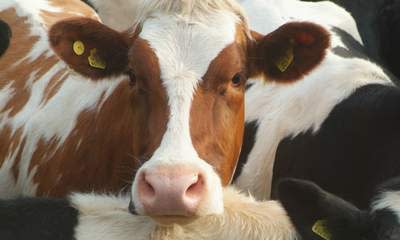Meat From Diseased Cattle Sold By Defra

Meat from cattle slaughtered after testing positive for bovine tuberculosis (bTB) is being sold for human consumption by Defra, the food and farming ministry has said.
The meat is banned by most supermarkets and burger chains, The Sunday Times reported.
Tesco, for example, rejects it because of "public-health concerns surrounding the issue of bTB and its risk to consumers".
But carcasses from around 28,000 diseased animals are sold to caterers and food processors every year.
The meat then finds its way into schools, hospitals and the military, or is used in products such as pies and pasties, the newspaper said.
A Defra spokeswoman said: "All meat from cattle slaughtered due to bovine TB must undergo rigorous food safety checks before it can be passed fit for consumption.
"The Food Standards Agency (FSA) has confirmed there are no known cases where TB has been transmitted through eating meat and the risk of infection from eating meat, even if raw or undercooked, remains extremely low."
Cattle which test positive for bTB must be slaughtered. Unless a private slaughter is arranged, the animals are taken to slaughter by Defra, which then pays compensation to farmers based on the market value.
Compensation ranges from £81 for a dairy calf up to £1,717 for an older breeding bull. Payments for pedigree cattle vary from £639 to £4,471.
Meat from slaughtered cattle is sold with no warning to processors or consumers that it comes from a bTB-infected herd.
A spokeswoman for the FSA said: "All meat must be marked with an identification mark which will indicate the approval number of the plant of origin.
"However, meat from TB reactors (animals that have failed tests for TB), once it has been passed as fit for human consumption, is not required to be marked in any way to distinguish it from other meat.
"Meat which passes the post-mortem inspection is fit for human consumption and does not need additional labelling."
The spokeswoman said that where an inspection of a carcass reveals tuberculous lesions in more than one organ or region it is declared unfit for human consumption and destroyed.
If the lymph nodes in only one organ or part of the carcass are infected, that area is removed and the rest is considered safe to enter the food chain.
"Cooking this meat would be an additional safety step, but we would emphasise the risk even before cooking is very low," she said.
George Browning, an organic farmer in Frankton, Warwickshire, told Sky News he would be "happy enough" to eat meat from a TB-infected animal.
"It's a waste for one thing," he said. "I'd rather eat something that had had TB than had been filled with drugs of all sorts, which I'd view as more unsafe to eat.
"People have got used to having cheap food and if you want cheap, you can't afford to be picky about what's in there."
The Sunday Times claimed Defra's reassurances contrasted with experts' warnings that rising levels of bTB in cattle are becoming a serious threat to human health.
Such claims have been used to justify a cull of tens of thousands of badgers which are said by some to help spread the disease between cattle.

 Yahoo News
Yahoo News 